#spartan royals
Explore tagged Tumblr posts
Text
Helen: "Menelaus, can you turn the lights on?" Menelaus: "I don't have to, you're the only light I need in my life" Helen: *blushing* Clytemnestra: "FUCKING TURN IT ON. WE CAN'T SEE SHIT!"
#greek mythology#incorrect greek mythology#greek heroes#incorrect greek heroes#incorrect greek quotes#incorrect quotes#iliad#incorrect iliad#spartan royals#helen of sparta#helen of troy#menelaus#clytemnestra#helen x menelaus
306 notes
·
View notes
Text
Ryu Number: Xerxes I
Xerxes I, also known as Xerxes the Great, was the ruler of the Achaemenid Empire from 486 BCE until his assassination in 465 BCE. At the time of his ascension to the throne, the Achaemenid Empire ran from the eastern end what's now Pakistan to the west end of what's now Turkey. You might notice that that's about the same amount of empire in about the same location as Alexander the Great had—that's because Alexander the Great was the guy who took over the Achaemenid Empire and made it not-so-Achaemenid anymore.
It was awful big, is what I'm saying.
But let's be honest: You probably know Xerxes I better as the Bad Guy with the nose ring in that one weird Spartan hagiography Gerald Butler was in. Fugging Miller.
Anyway, Xerxes I almost certainly has a Ryu Number of 2, and definitely not a Ryu Number more than 3, but there's some stuff.
The problem with finding a Ryu Number of Xerxes I is that 5th-century-BCE Persian monarchs don't show up in video games that often, for some reason. He makes a historical appearance in the Assassin's Creed Odyssey DLC Legacy of the First Blade...
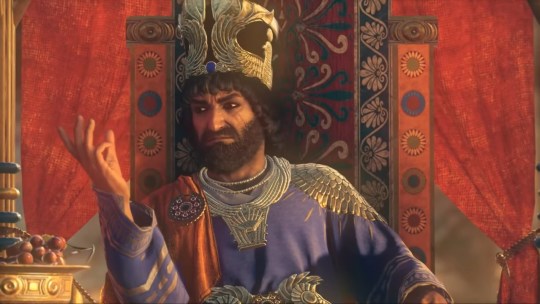
...but unfortunately, Odyssey takes place too far after the times of myth and legend for anyone big enough to be a Minecraft skin in Greek-mythology-inspired DLC to show up.
It doesn't help, either, that in Assassin's Creed lore, all the "gods" were just members of a Precursor Race pretending to be gods, a la Stargate. No, that's not "Hera," that's a jerk Precursor Person who's taken on the identity of "Hera," all the better to lead mankind around like a clowder of schmucks. She's pretending to be Norse elsewhere. Don't fall for it.
(There's also A Minotaur, which feels like it ought to connect via that Minecraft skin pack, but if I'm understanding the Odyssey lore correctly—and I very well might not be; holler at me—the minotaur the player encounters isn't actually the Minotaur from the myth we know and love, but some random other guy who subsequently got his hands on the Precursor Technology that turns you into a minotaur. Yeah, everything is Precursor People in Assassin's Creed. It's kind of disappointing.)
Of course, you can still get to Xerxes through Odyssey if you want to—a handful of historical characters who don't have Minecraft skins show up—but you'll need an extra step. And if we're going to have an extra step anyway, I'm going to go for the route that doesn't need Assassin's Creed, partially because I haven't played the games yet but mostly because I'm still really disappointed about the Precursor People thing.
Which means, unfortunately, it's back to Miller.
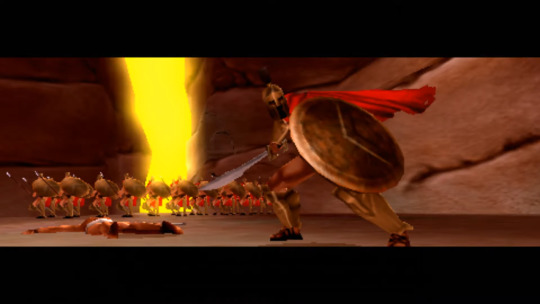
I'll say this: For all that 300: March to Glory is Not A Very Good Video Game, it left me the impression that someone behind the scenes actually did the bare minimum research into the Greco-Persian Wars. Persian commanders Hydarnes and Mardonius make appearances (if only to provide something unique to hit), and Mardonius even survives the movie-equivalent events of the game until an epilogic, post-movie level that takes place during the Battle of Plataea—which is, indeed, where the historical Mardonius bit it. It's not much, but I had to watch the whole dang thing, so I'll take what I can get. Gets me more names for The Chart, besides.
As for connecting this game to Ryu, you can, of course, count on the Ol' Dependable of Games With Historical Figures:

...Or maybe you're not a fan of Anime And Things That Look Like Anime, in which case, try this, instead:

I'm not sure I can explain how weird Spartan: Total Warrior is—by which I'm referring to its existence more than anything in the game itself, though the content's pretty weird, too. For context, Total War is a series of strategy games featuring a combination of turn-based strategy, resource management, and real-time tactical control (so sayeth Wikipedia). There are a coupla Warhammer entries in the franchise, sure, but the vast majority of the games focus on real, historical campaigns and factions.
Spartan: Total Warrior, on the other hand, is a hack-and-slash that took one look at a history book and immediately took a pair of shears to it. The story starts in 300 BCE: The Roman Empire, led by Emperor Tiberius, has conquered almost the whole of Greece, with only Sparta remaining, and Leonidas leads his men into battle to oppose him. Later, the Romans reveal a superweapon powered by the imprisoned Medusa. Sejanus, Tiberius' right-hand man, is a powerful necromancer who kills and resurrects Castor's brother Pollux. One mission involves protecting Archimedes, leader of the Athenian resistance, from assassination.
To quote someone on Discord, this is a game supposedly set circa 300 BCE that "has one side led by a king who died 200 years before, and the other by an emperor who reigned 300 years after (never mind the fact that Rome was still a senatorial republic)." If you forced a too-serious historian to play this game they'd end up on the floor in a frothing heap of rage and/or despair (actually, someone should totally do that; I want to see the Greco-Roman history version of Jonathan Ferguson having to analyze the firearms of Team Fortress 2).
Oh yeah and Beowulf is there.
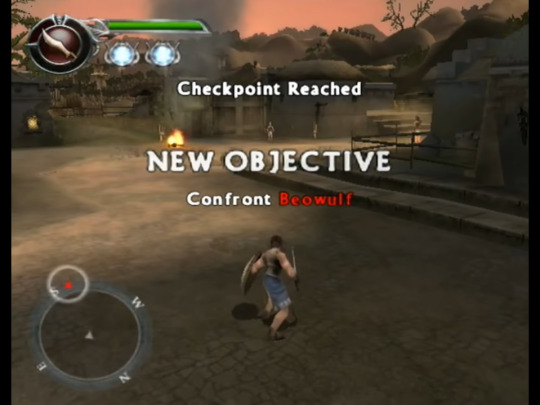
At some point you've got to appreciate—no, admire, even—the Xena:-Warrior-Princess-level decision to just Don't Worry About It.
And now that we have finished with the indisputable, let us proceed with the first of the hinky. Which is to say: Let's look at God of War: Chains of Olympus.
Chains of Olympus begins with an attack by the Persian navy on the Greek Attic peninsula (where Athens is, incidentally). The opening sequence features (among a whole lot of faceless Persian mooks) this prone-ish fella, who doesn't quite get to operating a ballista, irresponsibly leaving the work for Kratos instead.

(Credit: Migeman)
Inspecting the body after all the local ruckus is over identifies him as "Eurybiades," the "leader of the Athenian army."
Eurybiades was—according to historical record—a real person, though God of War doesn't exactly nail it on the head. Herodotus (who historians depend on more due to him being one of a Very Small Number of sources rather than anything to do with actual reliability) names Eurybiades as a Spartan who, during the second Persian invasion of Greece, was given command of the Greek navy due to some political whatuppery (the Spartans said that if a Spartan didn't lead it they'd be Awfully Uncooperative).
Following this bit, Kratos confronts the King of Persia (identity unspecified), who is apparently personally leading the invasion himself, which seems dumb but was apparently the norm back in those days. I bet we'd have a lot less wars if we made our Presidents actually serve on the front lines whenever they started feeling belligerent.

(Credit: Ibid.)
Anyway, Kratos kills the King of Persia, because if the King of Persia killed Kratos the game would be a lot shorter. Now, there's no watertight confirmation that this is the second Persian invasion—the first one also featured attempted Persian inroads into Attica, and was recent enough that it's not inconceivable for Eurybiades to have shown up, there, too—but if this is the second Persian invasion, and that is the King of Persia that was King of Persia during the second Persian invasion, then that King of Persia is Xerxes I.
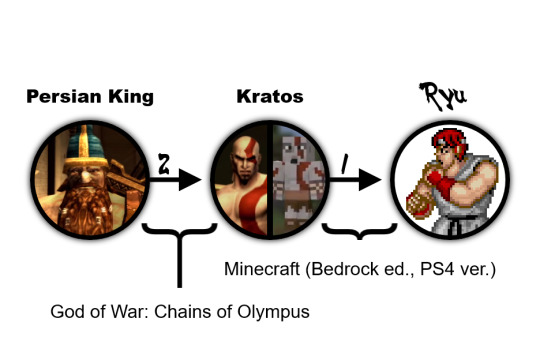
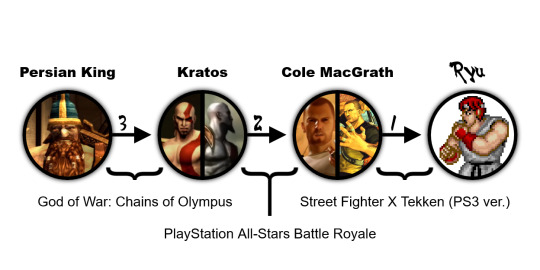
And now, I think, you peer up at me, gaze beseeching. "But KC," you say, anxious and afraid, "Xerxes I didn't die during his invasion of Greece! After Greek victory at the Battle of Salamis, Persian forces were forced to withdraw from Attica, including Xerxes I himself, after which he focused on lavish construction projects until he was assassinated fifteen years later for unrelated reasons! He didn't die in the Greco-Persian Wars at all!"
To which I say: You know who else didn't die in the Greco-Persian Wars? Eurybiades. And you know who definitely didn't die in a fit of paranoid, obsessive overwork in the heart of a monumental statue of Apollo on the isle of Delos?
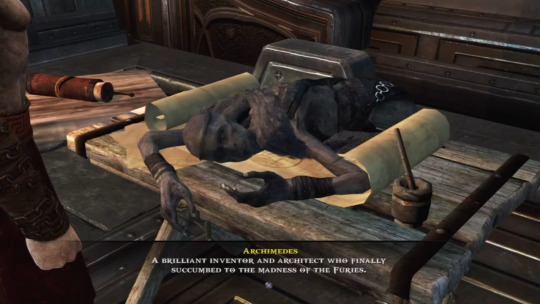
What I'm saying here is that God of War's relationship with historicality is fleeting at best, so maybe Don't Worry About It here, too.
(Incidentally, if it's the first Persian invasion of Greece that Kratos is mucking around in, then that king is actually Darius the Great, who also didn't die in Greece in real life. Darius is in Civilization V, though, so getting his Ryu Number is a lot easier.)

And speaking of Civilization, I've finally come to the shortest route I've found that, for all its likeliness, isn't as definite as I'd like, which is why I've saved it for last. You know how Civilization works, I think—you play a historical civilization (with a historical leader to match), and go up against other historical civilizations with their leaders. Like Darius, just now—he's your leader if you decide to play as the Persians.
Civilization III is like that...but unfortunately not as much like that as a fellow'd prefer. Sure, it's got its civilizations and leaders...
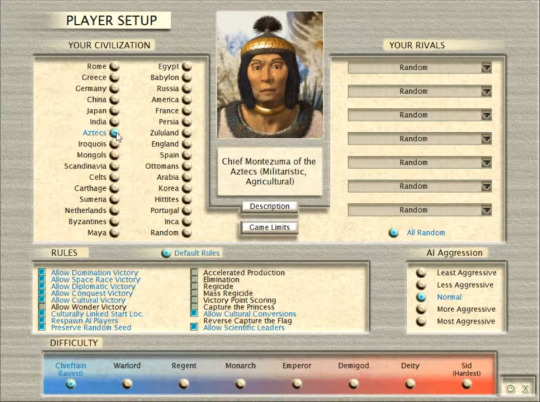
...But there's the occasional glaring unspecificity that's apparently there to make life difficult for me in particular. Yeah, sure, Montezuma here is most likely the second one—the one everyone knows, the one that had the real bad experience with Spain—but are you sure he isn't the first one instead? Like, absolutely sure? The instruction manual doesn't say, you know. How sure are you? Sure enough to bet a dollar? Two dollars? Fifty dollars? Your firstborn child? Why would I want your firstborn child, anyway? I don't want to look after a child; that's literally more work for me.

The Persian civilization exhibits the same problem here. Yeah, of course that's Xerxes I! If the team behind the game is picking out a historical figure named Xerxes to represent the Persians, it's got to be Xerxes I. But at the same time, there's technically nothing saying this isn't Xerxes II, a separate 5th-century-BCE Persian ruler of the Achaemenid Empire. I mean, it's terribly unlikely, seeing as Xerxes II ruled for 45 days before being killed by his half-brother, who ruled for six months before being killed by his half-brother, making him Not Exactly The Sort Of Individual You'd Put The Spotlight On, but Mahatma Gandhi and Joan of Arc are the leaders of Indian and French civilizations in this game, and that's weird, too. Gandhi was never the Prime Minister of India or anything like that, and Joan of Arc was a military leader, not a monarch.
Still, if you're willing to follow the reasonable assumption that the Xerxes here is Xerxes I, then the path that results is pretty dang optimal:
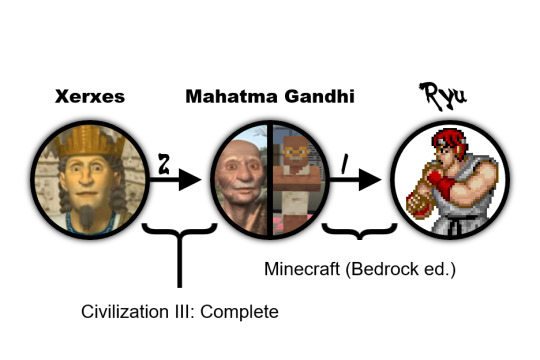
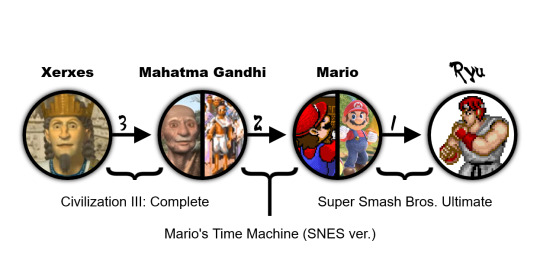
...If this is how you found out that Mahatma Gandhi is in Minecraft DLC, I'm sorry.
#ryu number#xerxes i#ryu#namco x capcom#minamoto no yoshitsune#fate/grand order#leonidas i#minecraft#minecraft (bedrock ed.)#ares#spartan: total warrior#minecraft (bedrock ed.#kratos#god of war: chains of olympus#street fighter x tekken#street fighter x tekken (PS3 ver.)#cole macgrath#playstation all-stars battle royale#mahatma gandhi#civilization iii: complete#super smash bros. ultimate#mario#mario's time machine#mario's time machine (SNES ver.)
84 notes
·
View notes
Text
Chapter title: The King of Salamis Chapters: 1/4 Relationships: Kastor/Paris, Polydeukes/Paris (background/minor Kastor/Hilaeira, Polydeukes/Phoibe, Telamon/Hesione)
Summary: The echo of abductions past reverberate through both the beginning and the end of the journey even before Paris reaches Sparta itself.
Before Paris can arrive in Sparta and become entangled in a conundrum of ethics and etiquette as well as of the heart, he has a few other incidents on the way. Learning of the life and stories of not just his aunt, long kept in Salamis, but, as he comes as a guest to the Dioskouroi, that of their wives, too. And then there is Kastor and Polydeuekes, who perhaps can make up for Paris' reception in Salamis.
#greek mythology#the iliad#trojan war#paris of troy#telamon of salamis#hesione of troy#lightart#no this wasn't JUST written just to let Paris sleep his way through#part of the Spartan royal family#I had serious reasons!#but it wasn't NOT written for that purpose#(':
4 notes
·
View notes
Text
hotd is back which means i once again have to deal with people throwing around the word “eugenics” when talking about the targaryens 🥱

#house of the dragon#spoiler alert: it's not about royals and feudal lords believing in the superiority of their blood#that's about the divine right of kings#ancient spartans murdering disabled boys at birth? eugenics. medieval kings and queens believing themselves to be inherently superior to#peasants and intermarrying to preserve their “blue” blood? not eugenics
5 notes
·
View notes
Text
I am looking at some of the sketches of Edward Pelham Brenton, who was Frederick Marryat's captain and commanding officer at the start of the War of 1812. Marryat called him "a scholar and a gentleman. Kind and friendly with his officers, his library was at their disposal."
Christopher Lloyd writes in Captain Marryat and the Old Navy:
It is probable that he exercised a very important influence over Marryat's development... And he is the only man whose help Marryat acknowledges when he was learning to sketch.
You can't blame Brenton for Marryat's amateur art, he was a better artist by far.


Here's HMS Spartan at Quebec, and two Barbadian women by Captain Brenton ("he loved the society of ladies," said Marryat). Capturing the variety of the Atlantic World so often described in Marryat's novels, with their frequent stops in Halifax and the West Indies.
The biggest influence I can see on Frederick Marryat in Brenton's art is his goofy sense of humour, like this caricature drawing called "Bucks of the first kind 1801".

#frederick marryat#captain marryat#age of sail#edward pelham brenton#naval history#atlantic world#naval art#hms spartan#biography#christopher lloyd#captain marryat and the old navy#royal navy
12 notes
·
View notes
Text
TNPL 2024: Nellai Royal Kings pips Salem Spartans by three wickets
The curtains closed on the first leg of the eighth edition of the Tamil Nadu Premier League with a photo finish at the picturesque Salem Cricket Foundation Ground as Nellai Royal Kings pipped SKM Salem Spartans by three wickets here on Thursday. Pursuing a modest target of 142, Royal Kings threw caution to the wind and it almost came back to haunt them in the end. With wickets falling at one end,…
0 notes
Text
Also black people have always been in Greek Mythology!! Andromeda was Ethiopian, so all of her descendants (HERCULES!!) would be called black by a modern audience.
There's Black characters in God of War, always have been, what are you gunna do? Be mad about it?

It's so funny bc there's racists still playing the game, still reblogging fan art of the characters, and still gave Santa Monica their money, and literally just have to go through the game fucking seething bc a brown person exists dhshfjcbvyf
#also their descendants include the Spartan royal family#so Tyndareus Pollux and Clytemnestra were black too#die mad about it
64 notes
·
View notes
Text
altars for greek heroes

ACHILLES: hero of the Trojan war, son of nereid Thetis
Colors: gold/bronze, red for Trojan War. blue, white for his mother Thetis
Offerings: yarrow, gold/silver, shells, gull feathers, olive, laurel, gemstones
Crystals: aquamarine, sodalite, jaspers (red, yellow, ocean especially)
*to honor Achilles you must also honor Patroclus*
PATROCLUS: hero of the Trojan war, son of King Peleus
Colors: gold/bronze, red for war. purple for royal birth
Offerings: incense/fire, oil, olive, laurel, gemstones, gold/silver
Crystals: agates (moss, tree especially), amethyst, lepidolite, rose quartz, citrine
ADONIS: lover of Aphrodite, became god of rebirth and beauty
Colors: pink, purple, red for beauty and association with Aphrodite
Offerings: fast growing plants (lettuce, fennel, barley, wheat), anemone and other flowers, dead plants, cake, honey
Crystals: flower agate, rose quartz, amethyst, rutilated quartz, jaspers (specifically rainforest or other green ones)
ARIADNE: helped Theseus to defeat the Minotaur, later married Dionysus and became goddess of labyrinths
Colors: gold for noble birth. purple for association with Dionysus
Offerings: grapes, puzzle toys, spools of thread or fabric art, wine, herbal tea, saffron
Crystals: grape agate, celestite, star jasper, pyrite, amethyst, scolectite, selenite
ASCLEPIUS: god of healing, son of Apollo
Colors: yellow, white for association with Apollo. red, pink, orange for healing
Offerings: snake skin, clay/bronze humanoid figurines, cypress, pine, olive trees, medicinal herbs
Crystals: quartz, rhodonite, amethyst, fluorite, selenite, citrine
ATALANTA: one of the Argonauts, devotee of Artemis, killed the Calydonian boar
Colors: brown, green for the hunt. white, blue, grey for association with Artemis
Offerings: pork, boar hide, apples, laurel, forgeables, lion/bear imagery
Crystals: jaspers, moss/tree agate, petrified wood, amethyst, rose quartz, selenite
CASTOR AND POLLUX: Pollux was a son of Zeus who shared his immortality Castor, they were turned into the Gemini constellation, saviors of seafarers
Colors: purple for noble birth. white and grey for association with zeus. black for the night sky
Offerings: shells, laurel, olive, meat, wine, two things conjoined (like two cherries or two grapes on a vine)
Crystals: star and ocean jaspers, sodalite, aquamarine, obsidian, hematite
HERAKLES: went mad and killed his wife and kids, did 12 labors as penance, god of strength and heroes
Colors: red, gold for strength and heroes
Offerings: hellebore, olive, laurel, meat, alcohol, yarrow
Crystals: bloodstone, carnelian, garnet, red jasper, smokey quartz, pyrite
HYACINTHUS: Spartan prince and lover of Apollo, became god of vegetation
Colors: pink, yellow, green for vegetation. yellow/gold for association with apollo
Offerings: iris (they were called hyacinths by the Greeks) and other flowers, grain, yarrow, clove
Crystals: tree/moss/flower agate, jaspers (especially bumblebee), citrine, carnelian, pyrite, honey calcite, amber
ODYSSEUS: clever hero of Homer's "The Odyssey," favored by Athena
Colors: gold, purple for royal status. grey, white for wisdom
Offerings: owl feathers, shells, boat imagery, poetry/speeches, laurel, olive, cypress
Crystals: jaspers, obsidian, quartz, aquamarine, turquoise, sodalite, bloodstone
ORION: lover of Artemis, was turned into a constellation after death. Sirius is his dog and Scorpius the scorpion that slayed him
Colors: black, white for night. brown, green for the hunt
Offerings: forageables, apples, hides/leather, mugwort, cypress, moon shaped items
Crystals: star jasper, bloodstone, selenite, celestite, howlite
ORPHEUS: son of Apollo, famed musician and poet of the Argonauts, travelled to Haides to try to save his wife Eurydice
Colors: yellow, gold, white for Apollo. black for the Underworld
Offerings: music (especially lyre), poetry, hymns, honey, laurel, wine, meats
Crystals: aventurine, obsidian, black tourmaline, smokey quartz, selenite, yellow jasper, honey calcite
PERSEUS: son of Zeus, slayer of Medusa, has a constellation
Colors: gold and red for hero status. white, grey, blue for association with Zeus
Offerings: meat, laurel, snake shed, alcohol, fruit, honey, milk (to honor his mother Danae)
Crystals: jaspers (red, star especially), bloodstone, serpentine, quartz, obsidian
THESEUS: slayer of the Minotaur, united Attica, completed six trials for the entrances to the Underworld that he passed on the way to Athens
Colors: blues for ocean, being a son of Poseidon (in some stories)
Offerings: ship imagery, meat, olive, yarrow, gold
Crystals: pyrite, sodalite, lapis lazuli, coral, blue aventurine, aquamarine
#pagan#paganism#polytheist#witchblr#witchcraft#polytheism#witch#magic#magick#greek polytheism#greek mythology#greek gods#ancient greek#ancient greece#greek heroes#the iliad#odysseus#achilles#achilles and patroclus#patroclus#orpheus#theseus#asclepius#hercules#herakles#castor and pollux#hellenic gods#hellenic polytheism#hellenic pagan#hellenism
200 notes
·
View notes
Text

The Spartan Royal Family
#helen of sparta#helen of troy#hermione of sparta#menelaus#the iliad#trojan war#paris of troy#hector of troy#agamemnon#clytemnestra#the oddyssey#odyessus#penelope of sparta#penelope of ithaca#telemachus
127 notes
·
View notes
Text
An Overanalysis of Zuko and Food (plus Iroh)
So, I've seen a lot of meta about how Zuko appears skinnier at certain points in the series depending on where he is in his arc. During the worst parts of Zuko's time as a refugee in season two, he seems to have lost a lot of his muscle mass, but towards the end of season two, he's less muscular than season one Zuko but distinctly rounder in the face, as he becomes more adjusted to a more (relatively) normal teenage life, living under a roof and not as a captain of a naval vessel, having access to a stable food source, and letting himself be taken care of by Iroh. At the beginning of season three he's in the palace, with plenty of access to food, but appears much thinner, and several people have made the inference that it was likely Zuko was not eating as well due simply to the anxiety of being back with his abuser.
But I've also noticed several other interesting things that could indicate something about Zuko's relationship to food. In book one, Zuko is built up, he's a military leader, he's trying to fulfill his role as prince of a nation that values strength and power, and there's one scene in particular that shows him not eating, in contrast to Iroh.
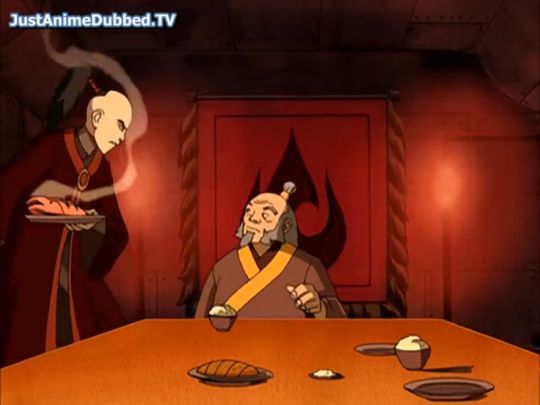
We see Zuko raging over not being able to capture Aang while at dinner, and Iroh asks him if he's going to eat his food, to which he replies that he's going to eat it later, and angrily takes it away from Iroh.
The main purpose of this scene is to contrast Zuko's single-minded determination with regard to his mission with Iroh's hedonism. Even on a military vessel, Iroh is presented as the antithesis of Spartan Fire Nation military culture. Zuko shows clear distaste for this behavior, because he has learned to detest it from his father, and angrily takes the food away from Iroh, saying he's going to "finish it later." And book one Zuko looks like he probably isn't missing any meals. He's jacked, and he's probably eating a lot of protein to keep up that physic. But is he going to sit around enjoying a meal when he's stressed about finding the Avatar? Absolutely not. The food in this scene looks very inviting, steaming hot, but Zuko will eat only when it's necessary to do so, and won't tolerate uncle eating more than his fill.
At the start of book two, Zuko and Iroh are without the trappings of even Zuko's banishment. They've lost everything, and are forced to forage for food, an endeavor that is less than successful. They are fed by Song's family, and I've seen some theorize that Iroh intentionally poisoned himself in order to force Zuko to seek help, which is an interesting theory considering that given stressful and even dire situations, Zuko's inclination seems to be to turn down food more often than not.
When Zuko is later separated from Iroh, we see him contemplate stealing food when faced with starvation, but makes the decision not to steal from a pregnant family.

Later in season two, Zuko and Iroh are living as refugees in Ba Sing Se. Zuko no longer looks bone thin, and presumably has stable access to food, although not the royal trappings of a prince. He's much more filled out, but appears more round and less lean muscle. We see him visit a restaurant with Jin, and we get a close up of him pushing around his food on the plate to indicate his anxiety about the date.

(I also want to mention here that in the "Going Home Again" comic, which takes place before the start of book three, Mai says that the food in Ba Sing Se is awful and Zuko says it's not so bad once you get used to it.)
Then at the end of book two, when Zuko recovers from his sickness, he immediately is interested in the jook that uncle is making, to Iroh's surprise, who says that Zuko wouldn't like it. Zuko happily eats a bowl despite this.

This is meant to show us Zuko's newfound appreciation for life after recovering from spiritual sickness. But it's also interesting when taken in the context of Zuko's previous relationship with food. Iroh assumes that Zuko will not want to eat the jook, but one thing that is interesting is that it's a meal commonly made by adults for children or others recovering from illness. We can infer that Iroh was making the jook for Zuko, despite his assertion that Zuko wouldn't want it. I think this is consistent with how we see Zuko turn down food when he is uncomfortable or anxious, but when he's in a place where he feels safe, he will let himself eat.
Finally, at the start of book three, we see Zuko turn down food when being offered it by servants.
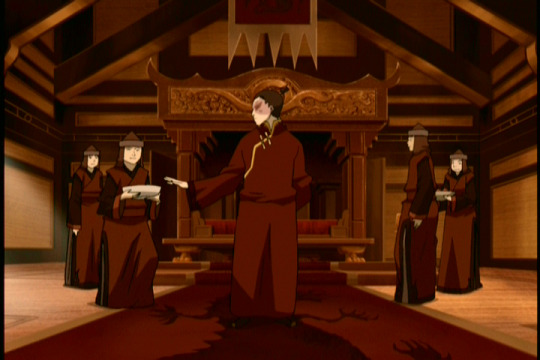
And finally only accepting a hot towel (used to wipe away sweat.) Despite having access to excesses, he's uncomfortable and constantly on edge.
I also have to mention Mai again here, and how Zuko, despite turning down food for himself, offers to get food for Mai, which is meant to show us how Zuko struggles to connect to the world in which Mai belongs. It's worth mentioning also that we see Zuko bring Mai food twice in the beach to try and make her happy (and failing) while eating nothing himself.
We also see Zuko offer Iroh food in prison.

Zuko says that even though he knows it's not Iroh's favorite, it beats prison food. This actually mirrors Iroh making the jook for Zuko in book two, which Iroh says Zuko does not like, but making it for him anyway. Zuko is trying to return uncle's care for him, but what Iroh really wants is for Zuko to be safe.
At the tail end of book three, Zuko seems to have gained back some of his muscle mass, and appears much more comfortable with the gaang, but he's still shown not indulging when the rest are.
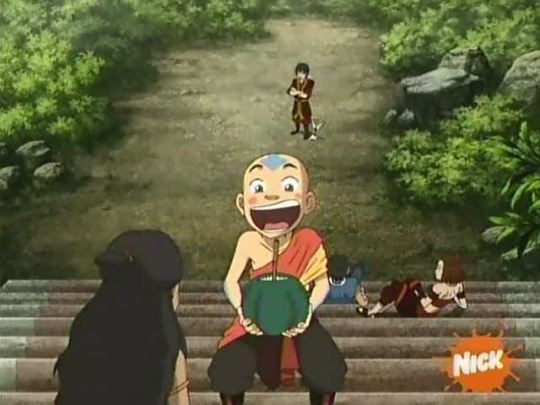
The screenshot actually frames him in direct contrast to the rest of the gaang, as Aang's teacher who is strict about him goofing off during training (a callback to season one Zuko who was displeased with Iroh's hedonism). We don't know if Katara had any watermelon juice herself, but she's seen making several "glasses." (Hello, momtara and dadko.)
Anyway, I think Katara the gaang made sure Zuko had enough food and that he was eating, and that he reciprocated by making them tea in return.
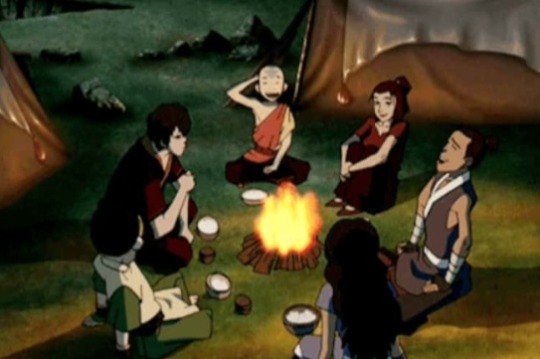
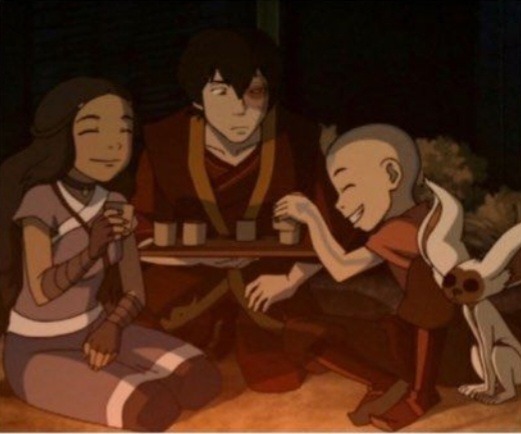
145 notes
·
View notes
Note
Just a fun note on character designs: Perseus and his wife Andromeda, who was an Ethiopian Princess, and the ancestors of the Spartan Royal Family in The Iliad and The Odyssey. This means that you can depict Tyndareus, Clytemnestra, Pollux, and Penelope as what modern society would call 'black' and have canonical mythological backing.
oh thats cool!! i really wanna flesh out my clytemnestra and helen designs. is it more widely accepted for her to be the daughter of tyndareus or zeus?
341 notes
·
View notes
Text
Helen: why are you following me? Menelaus: because we’re dating now Helen: okay… what about Agamemnon? Agamemnon: we’re a package deal Clytemnestra: buy one idiot, get one free
#greek mythology#incorrect greek heroes#greek heroes#incorrect greek mythology#incorrect greek quotes#incorrect quotes#iliad#incorrect iliad#spartan royals#helen of sparta#helen of troy#menelaus#helen x menelaus#agamemnon#clytemnestra#agamemnon x clytemnestra#mycenaean royals
223 notes
·
View notes
Note
What are your top ten Greek Mythology headcanons?
Ooooh I have a lot of Greek mythology headcanons, so it took me a while to select the top ten 😅 But I've finally done it!
Here is the final list:
10. There is an Eurotas River "tradition" for all the couples in the Spartan royal family.
I like to think it's "tradition" for all members of the Spartan royal family to find the love of their lives at the Eurotas River (Lacedaemon & Sparta, Amyclas & Diomede, Hyacinthus & Apollo, Helen & Menelaus, etc.)
The idea came to me because of the role and presence of this river in Apollo and Hyacinthus' myth (Ovid's version) and Menelaus and Helen's story (Euripides' play). HyaPollo had frequent river dates and MeLen swore fidelity with one another by the same river, so it's fun to think that the other Spartan couples also meet and spend their time together here.
9. Persephone is everyone's childhood friend.
This is also true in the mythos! Persephone grew up with Athena and Artemis in Sicily, her domains overlapped with her other siblings, the Homeric hymn to Demeter has a list of her nymph friends, and every once in a while someone is said to be Persephone's playmate.
She's a true social butterfly lol
8. The second generation Olympians also share traits with their grandparents.
I love to think that the younger Olympians inherit something from their Titan grandparents, you know? Here are some of the ideas:
Ares is loving and protective over his children like Rhea.
Persephone is intimidating and wield her scythe like Kronos.
Hermes is crafty and cunning like his great-grandfather Iapetus.
Apollo has Coeus' deep, intelligent gaze and Artemis has Phoebe's radiant smile.
Athena is unconsciously attracted to the ocean, the kingdom of Oceanus and Tethys.
7. All of Zeus' children, mortal or immortal, inherit his fury.
They can be calm like Apollo or have anger issues like Heracles, but once a child of Zeus get really pissed off, their act of wrath can be as destructive as their father's.
This explains why Artemis shot down Coronis and her family and Persephone inflicted a plague on Thebes.
6. The second generation Olympians (plus Persephone and Aphrodite) love each other in their own ways.
I really dislike depictions of Olympian siblings always at each other's throat. Yes, their history is complicated and dynamics aren't perfect but that doesn't mean they only have bad tension! Where is the nuance in their relationship???
Artemis and Apollo have seen the worst of one another and ridiculed each other for that. But if someone were to talk crap about their twin, it's on sight.
Ares is torn between following his mother and accepting his illegitimate siblings. He had persecuted the twins before they were born but later joined them in the Trojan war.
Athena might be distant from others at times due to her personality and domains, but there are moments she enjoyed dancing and playing music with her siblings.
And Persephone's case is the worse. She might not be an Olympian and stays in Underworld for half a year, but she had never expressed hatred for her non-chthonic family. Let Persephone have good relationship with her upper world family, too!!!
5. Hyacinthus has purple eyes.
Or, in elaborative words, the eyes ever so gentle like flower petals drifting on a calm lake in early spring, hand-painted by the finest of brushes with a meticulous shade of softly vibrant purple that could not be easily sought out in the tapestry of nature.
Sorry for the sudden poetic wax XDDD
Basically, I want Hyacinthus to have pretty purple eyes as one of his signature traits. It makes him stand out from the crowd due to the "divinity" it brings to him (because of the forth headcanon)
4. Hyacinthus' mother is Clio, the Muse of History.
The second-popular parentage of Hyacinthus in the myths, but I have lots of ideas and interpretations with this mother and son relationship:
- The son of the history Muse dating the god of prophecy. Past and future intertwine!
- Their domain and attribute! We study history to learn from the past mistakes and avoid repeating them. The hyacinth flower represents forgiveness, and I like to think it includes self-forgiveness as well. So Clio being Hyacinthus' mother can symbolize accepting and learning from your mistakes to forgive yourself.
- Family angst! Clio knows every way something can go wrong and result in her son's tragic end. So throughout Hyacinthus' life, she will do her best to prevent all possible demises that can happen to him, only to still end up losing him.
- It will give Aphrodite another reason to aid Hyacinthus' resurrection. Since Aphrodite is the one cursing Clio to fall in love with a mortal man and have Hyacinthus, she might feel guilty later when Clio was grieving her son, so she decided to help the mother and son reunite as repentance.
3. Polyboea becomes a huntress of Artemis.
We actually don't have any clear indication that Polyboea became a huntress of Artemis in the myths, but hey, it's not a bad headcanon! Polyboea died a maiden, and Artemis was fond of her enough to help bring her back from death. So it wouldn't be a stretch of the goddess recruit her into the hunter pack.
I have a lot of ideas for a Polyboea-centric fic after she became a virgin huntress, just her journey in perfecting the art of archery, making friends with the other huntresses, and learning to be her own person than just "the youngest princess of Sparta".
2. Apollo and Hyacinthus raise children together.
This heacanon definitely didn't come to me after reading a certain fanfic series hehehe...
The title said all, I like to thing after Hyacinthus' deification, he and Apollo are happily "married" and raise a bunch of kids together, adopted or from another lover (and they may or may not have a child together). Those kids will have the best childhood!
1. Hyacinthus and Polyboea undergo many trials in the Underworld before being granted resurrection and immortality.
As much as I love Hyacinthus and want him to have a happy ending with his loved ones, he's a potential package for physiological and psychological torture :)
There isn't much that we know of about Hyacinthus' resurrection in the myths other than him and his sister, Polyboea, being taken to the Heavens by a parade of deities. But I don't think the Underworld will allow two of their residents to go easily, so Hades and Persephone must have given Hyacinthus and Polyboea a trial like they did to Orpheus and Eurydice, but it will be 1000x worse because love me some blood-choking angst :D
For what the Underworld trials are and how Hyacinthus and Polyboea overcome them, they are will remain for now as ideas and concepts in the making for my Hyapollo fanfic
#you can see the higher ranking HCs are all about Hyacinthus#i'm so normal about him haha...#greek mythology#greek gods#greek goddesses#greek deities#the twelve olympians#headcanon#tumblr ask#ask me anything#mutual asks#long post#The Pen writes answering letters#yeah i'm making my own branded tags now :>>>
69 notes
·
View notes
Text
Troy (2004) Masterlist

Requests for this movie are permanently open.
Pending requests - 6
Oneshots
Battle Scars - (Platonical) Hector x Sister Reader
Our Strenght Lies in Family - (Platonical) Paris x Sister Reader x Hector
Imaginary Feats - Patroclus x Trojan Princess Reader
Silent Pray - Part 1 - Part 2 - Chryseis and Odysseus centered movieverse retelling of the Illiad’s startpoint / oneshot spreaded in two parts.
The Daughter of the Priest - Part 1 - Continuation for “ Silent Pray.”
Fool - ( Pre War) Paris x Healer Reader
Songs of Sailors - Platonical (Family) relationships of the trojan royals and allusions to different romantic pairings.
Pairings Mentioned: Helen x Paris (most mentioned), (Implied) Patroclus x Trojan Princess Reader, (Implied) Achilles x Briseis, Hector x Andromache.
Faith or Facts - Hector x Greek Seer!Reader (Female)
The Insolence of Beauty - Post quarrel, Agamemnon centered.
For Honor and Love - Helen x Paris (requested)
Into a New Life - Paris x Spartan Servant!Reader (requested)
For a Love Like This - Paris x (fem) Warrior!Reader (requested)
Undying Legends - Achilles x Princess!Reader (requested)
Accomplices - Patroclus x GN Reader (requested)
The Last Challenger - Ajax x Fem Reader (requested)
Borrowed Bride - Achilles x (fem) Trojan!Reader
A Thousand Times - Paris x Fem Reader (requested)
Anonymous Hero - Hector x Fem Warrior!Reader (requested)
Personal Guard - Eudorus (Fem) Shy Reader (requested)
Third Fate - Achilles x Fiancee!Reader (requested)
Things that will grant me your love - Paris x (Fem) Reader (requested)
The Curse of Poseidon - Paris x Helen Merman AU (requested)
Concealed Fighter - Hector x Wife!Reader / Achilles x Captive!Reader
The Veiled One - Ajax x (Fem)Reader (requested)
Our Fight - Hector x (Fem)Reader (requested)
Artists of Deception - Odysseus x Wife!Reader (requested)
Eternal Courtship - Achilles x (Fem)Captive!Reader (requested)
Matured Desire - Achilles x (Fem) Reader smut (requested)
By Duty and Chance - Hector x (Fem) Reader (requested)
His Weakness - Achilles x (Fem)Reader
A Man of Honor - Odysseus x Trojan Princess!Reader (requested)
From the Deepness of the Sea - Hector x Siren!Reader (requested)
The Wave’s Caress - Achilles x (Fem)Reader (requested)
In These Arms - Achilles x (Fem) Reader
Headcanons
Achilles’ Type (requested)
-Achilles + Patroclus’ turnoffs/dislikes (requested)
- Achilles reacting to a Belle-like town’s freak (requested)
Preferences
- Reactions to your singing
- How they comfort you when the war is bringing you down
-Their Types (Fem partner version)
Achilles x Mycenaean Princess!Reader Series
Part 1 - The Bride’s Misery
Part 2 - Fame and Tales
Part 3 - The Veil Trick
Part 4 - To Make a Difference
Part 5 - Family Matters.
Part 6 - A Curse, a Plot and a Rushed Farewell
Part 7 - Invisible Influence
Part 8 - The Rejected Side
Part 9 - Consecration.
Part 10 - Royal Treatment
Part 11 - Aligned Improvements.
Part 12 - The Weight of Words.
Part 13 - Occulted Relic
Part 14 - Goodbye Encounters
Part 15 - Separations, welcomes and the story of an avoidable disaster
Part 16 - Service to Good Judgement.
Part 17 - Galatea and a Maenad fighting in the second front
Part 18 - The Enygm of the Horse Emblem
Part 19 - No Space for Loneliness.
Part 20 - The Games.
Part 21 - The Man of Aphrodite
Part 22 - Diverted Course
Part 23 - Golden Chains
Part 24 - Loving in the Shadows
Part 25 - The Trial of Achilles
Drabbles
Calm After the Storm - Odysseus x Reader
Divine Beauty - Paris x Reader
A Breath of Life - Patroclus x Gender Neutral Reader (Requested)
The Right Way - Achilles x (Fem)Reader (Requested)
#troy 2004#troy#troy 2004 x reader#troy fanfiction#achilles x reader#hector of troy x reader#paris of troy x reader#patroclus x reader#odysseus x reader#eudorus x reader#ajax x reader
35 notes
·
View notes
Text
RISING SIGNS AND THEIR CONNECTION TO OUR NAME PT. 3 -fire signs-
———--———‐‐‐—✦‐‐———‐‐—✦———‐—✦
disclaimer: this is just my personal observation and i'm not saying your name will be 100% connected to your rising sign, so take this with grain of salt!
———--———‐‐‐—✦‐‐———‐‐—✦———‐—✦





———--———‐‐‐—✦‐‐———‐‐—✦———‐—✦
1. ARIES RISINGS:
being honest I don't know any aries risings personally. this will be based on celebrities, i'm sorry fellow aries risings :/. these folks usually have long names, or names with heavy pronunciation, lots of SHs and Rs. since they represent a ram they are not necessarily connected to fire. some of the meanings those names could have: spring, flowers, dragon, courage, dancing, art, warrior, fire, persistence, strength, boldness, tower, iron. those names could be of mongolian, latin, greek (spartan) and arabic origins. you could be even named after great warriors, comadants, rulers (napoleon, katherine the great). names i've noticed amongst these folks: shakira, timur, sheyla, seulgi, batzorig.
2. LEO RISINGS:
their names are a great combo with their last name most of the time (tina turner, marilyn monroe). they are not long, but not short, they are usually not even hard to pronounce and are very easy to remember, that helps them become really well known. names could carry those meanings: sun, shine, bright, lion, king/queen, gold, passionate, vivacious, royal, theatrical, spotlight, warm, strict, righteous leader. they could've got their names from royalty and they could be of any origin but usually french or british. the names i noticed among leo rising folks: leila, danin, margot, basile, soleil, elin, jin.
3. SAGITTARIUS RISINGS:
like the name of their zodiac rising their personal names could be long as well, or just funny to pronounce even tho they are short. (cheryl cole). however those names are unusual and are very unique. i didn't notice a certain pattern in word or letter play in their names, it connects to the witness and originality of sags. their full names could end sentences or make slangs (summer dawn, fa hua and other examples in other languages). they tend to have lots of nicknames. possible meanings: arrow, funny, smart, curious, hot, healer, princess/prince, chiron. names i've noticed: anne, tequila, summer, višnja, dunja, persephone, diana, dahyun.
———--———‐‐‐—✦‐‐———‐‐—✦———‐—✦
I hope it resonates and I hope you like it! Don't forget to leave notes ♡
#astro observations#jennie icons#future spouse#pac reading#pick a card#astro notes#astrology notes#gg icons#blackpink#astrology observation#fire signs#seulgi#sagittarius#aries#leo#pick a pile#tarot#astrology#rising sings#tarot pick a card#pick a card reading#pick a deck#kpop icons#kpop headers#chaeshitty#love reading#gg layouts#tarot readings#future spouse reading
638 notes
·
View notes
Note
Hello :3
I'm working in a little proyect… A comic (more like a graphic novel) of Artemis and Apollo stories, but i'm struggling with Apollo's lovers chronology 🫠
I will discard Daphne… I know if we took Ovid, she was his first love crush, but 1) She wasn't a lover, so… not a first love of Apollo :P And i want a romantic first love u.u 2) She is overrated, i want to give some credit to the underrated ones.
Then whe have Admetus, if we took the punishment for killing Python, but according to that, the Apollo's lover was Hymenaeus/Thessalian Hyacinthus… And i prefer the Spartan Hyacinthus and the version of Admetus servitude after killing the Cyclops.
There is Cyrene too… Apollo talking to Chiron about Cyrene was like a teenager falling in love, and could be his first enamourment. Also because he goes to Chiron to some advices. He wasn't sure about how to talk with Cyrene… Could be a first love.
And Branchus! I did read that Apollo saw him after coming from Delos riding a dolphin and… He was leaving Delos, his birth land, so could be a possibility of Branchus being the first love of Apollo. And Apollo was so smitten in this myth… He was so in love that got distracted and milk a billy goat LMAO That was a teenager in love! This also make me consider the idea of Branchus being his first love and boyfriend <3
I personally like him, but i also would consider Cyrene… And not having a chronology is makes the things hard. I need help… Please be my wise Chiron and give me your advices 🫡🙏
Oooh this one is a tough one!
About Daphne : understandable lol though yeah, I don't think you can exclude her entirely because the laurel tree was very sacred to Apollo and his cults.
Admetus is a bit tricky. On one hand, he is one of the argonauts, and their journey happens nearer to the Trojan war I believe, since Admetus' son participates in the trojan war. Adding to that, Asclepius' sons were also amongst suitors of Helen, and they participated in the war as well. So Apollo's servitude under Admetus for killing the Cyclopes also didn't happen early on in Apollo's life. But on the other hand, there is a version where Apollo had to serve for the act of killing the Python - which in most versions happens when he was a child - so he'd have been a pretty young god when he met Admetus. Adding to that, Hesoid has written the tale of Hermes stealing Apollo's cows when the latter was serving Admetus. The birth of Hermes and the cattle theft couldn't have happened just a few decades before the trojan war imo. So again, although in Hesoid's version Apollo falls in love with Hymenaeus, this version places the servitude fairly early on in Apollo's life. I used to hc is that since Admetus and Alcestis cheated death, they were allowed to live a very long life - this way I don't have to exclude any of the events that include him but happen at different times - but even that doesn't work because you need to fit Pelias (Alcestis' father and Jason's uncle) in the earlier part of the timeline and it just doesn't make sense :') so yeah, Admetus isn't the best choice either imo
Now onto Hymenaeus. I know theoi.com says that he is Thessalian Hyacinthus, but like. That's one interpretation. It's up to you to decide if they were the same person or not. Personally, I don't find the explanation given by theoi.com satisfactory and consider Hymenaeus and Hyacinthus different people. Hymenaeus would be a good choice. Not only is he mentioned by Hesoid, one of the oldest poets, this version also seems to place the event early on in Apollo's life like I've already said.
You can go for Hyacinthus too, especially if you want to ignore Hymenaeus. According to Callimachus, Apollo laid the foundation for Sparta. Given that Hyacinthus belongs to the first few generations of the Spartan royal family (2nd or 3rd) - it's possible that he was Apollo's first lover. Another detail is that, in the Homeric hymn to Demeter, Persephone is said to have been gathering flowers and one of them was hyacinth flowers! According to this, Hyacinthus' death happened even before Persephone married Hades.
Now Cyrene. I don't think she was his first lover. I've always imagined her to be one of the first few loves of Apollo...but if you look at the myths, the ones about their son Aristaeus seems to be set in a time closer to when Dionysus was born/lived on the earth. He is Dionysus' mentor/father figure in one version. He is also, in one version, responsible for the death of Eurydice (and Orpheus was a follower of Dionysus at that point). Aristaeus' son Actaeon is Dionysus' cousin, who was killed for peeping at Artemis. Also when Aristaeus was born, Hermes parades him around so...Cyrene must have happened after Admetus and Hymenaeus at least.
I've never given too much thought on where Branchus would fit tbh. But I looked up a bit more on him and - according to Strabo, Achilles' son Neoptolemus was killed by Machaereus, and Branchus was a descendant of Machaereus. But other than this, the myths I'd read on him don't involve any prominent mythical figures or events. If you wanna ignore Strabo's account, you can make him Apollo's first lover.
Of the lovers that you've mentioned, i think it'd be either Hyacinthus or Hymenaeus. Personally though, I've always imagined one of the Muses (or all of them at the same time? Haha) to be his first lover. It makes sense to me because he was trained under them.
All that said, I cannot pin point who his first lover was. Because we have contradicting versions, some of which you'll probably have to ignore if you want a coherent story. So which ones you want to ignore, I'll leave it up to you. I hope this helps you a bit!
37 notes
·
View notes